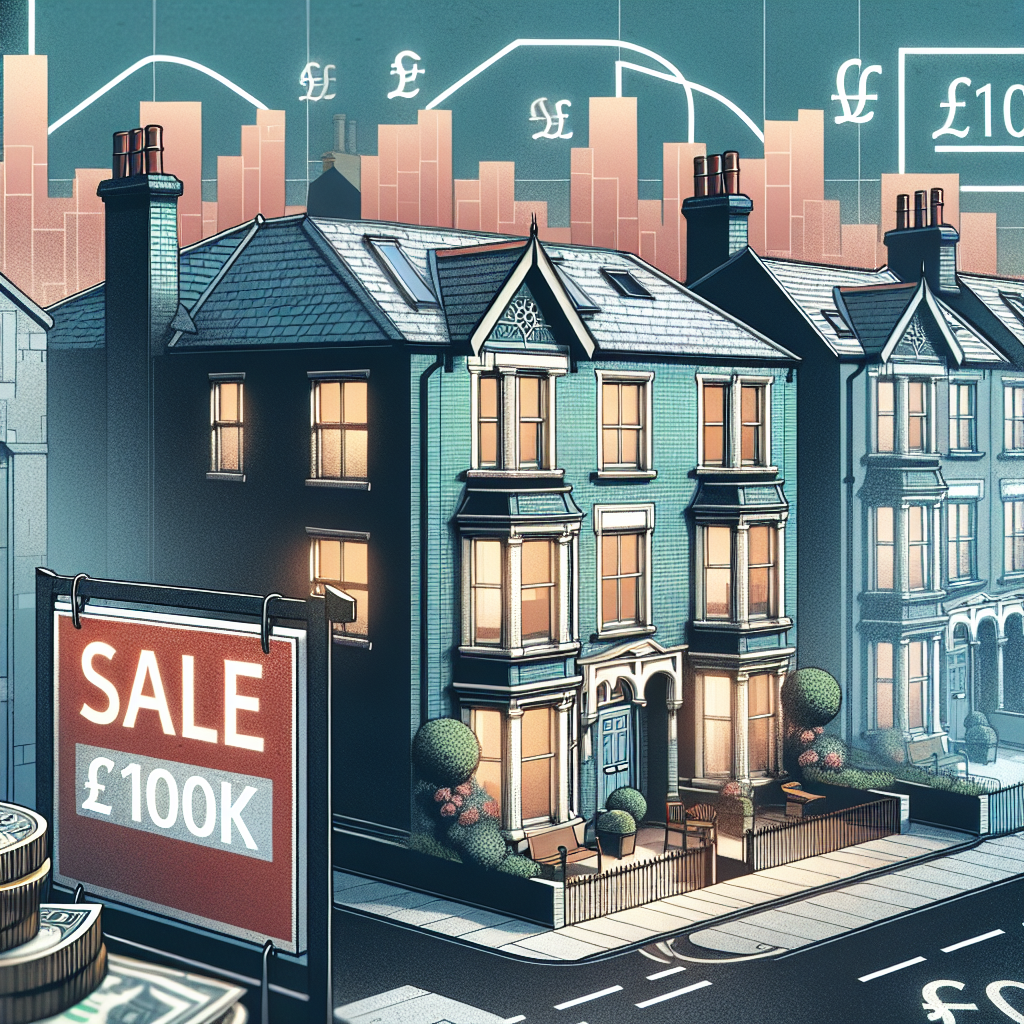Have you ever wondered what kind of house you could afford with a yearly income of £100,000 in the UK? It’s an exciting prospect to imagine the possibilities that await you. In this article, we will explore the housing options that could be within your reach based on your income. From charming apartments in vibrant city centers to spacious suburban homes with beautiful gardens, we’ll help you envision the kind of home that could be yours. So sit back, relax, and let’s explore the exciting world of housing affordability in the UK.
Factors to Consider
Typical Expenses
When considering what house you can afford on a salary of £100,000 a year in the UK, it’s crucial to take a closer look at your typical expenses. These expenses include your monthly bills, groceries, transportation costs, and any other recurring payments. Understanding your typical expenses will give you a better idea of how much money you have available each month to put towards your mortgage.
Debt and Monthly Payments
Debt can have a significant impact on your ability to afford a house. Take into account any outstanding debts you may have, such as student loans, car loans, or credit card debt, and consider the monthly payments associated with them. When calculating your mortgage affordability, it’s important to factor in these existing financial commitments to ensure that your monthly mortgage payments are manageable alongside your debt repayments.
Savings and Down Payment
Having savings for a down payment is an essential part of affording a house. The more substantial your down payment, the more affordable your monthly mortgage payments will be. It’s advisable to save at least 20% of the property’s value to avoid paying for private mortgage insurance (PMI) and lower your overall borrowing costs. Consider your savings and how they can contribute to your ability to afford a house on a £100,000 salary.
Credit Score and History
Your credit score and history play a crucial role in determining your mortgage affordability. Lenders use this information to assess your creditworthiness and determine the interest rate at which they’re comfortable lending to you. It’s recommended to have a good credit score (above 700) and a clean credit history to secure a favorable mortgage rate. Take the time to review your credit report and address any errors or issues that may negatively impact your creditworthiness.
Future Financial Goals
When thinking about affording a house on a £100,000 salary, it’s vital to consider your future financial goals. Are you planning to start a family, travel extensively, or pursue higher education? These goals will impact your financial situation and determine how much you can comfortably allocate towards your mortgage payments. Taking these goals into account will ensure that you can not only afford a house but also maintain a comfortable lifestyle.
Mortgage Affordability Calculation
Income
Before diving into the specifics of mortgage affordability, it’s crucial to understand your income. With a salary of £100,000 a year, you have a solid foundation to consider various mortgage options. However, it’s essential to keep in mind that lenders typically look at your net income, which could be lower due to taxes and other withholdings. Assessing your net income will give you a more accurate view of your actual buying power.
Debt-to-Income Ratio
One important factor in determining mortgage affordability is your debt-to-income ratio (DTI). This ratio measures your monthly debt payments against your gross monthly income. Lenders typically look for a DTI ratio of 43% or lower. To calculate your DTI, add up all your monthly debt payments (including your estimated mortgage payment) and divide it by your gross monthly income. If your DTI ratio exceeds 43%, it may be challenging to secure a mortgage or obtain favorable terms.
Affordability Guidelines
Mortgage affordability guidelines can provide a general framework for assessing how much you can afford. These guidelines typically suggest that you should not allocate more than 28% to 36% of your monthly income towards housing expenses, including your mortgage payment, property taxes, insurance, and any homeowner association fees. Applying these guidelines to your £100,000 salary will give you a rough estimate of your maximum monthly mortgage payment.
Mortgage Affordability Calculator
To get a more precise understanding of how much house you can afford on a £100,000 salary, consider utilizing a mortgage affordability calculator. These online tools take into account various factors, such as your income, debt-to-income ratio, and desired loan term, to generate an estimate of your maximum mortgage affordability. Keep in mind that while a mortgage affordability calculator can provide a starting point, it’s always advisable to consult with a mortgage professional for a comprehensive analysis tailored to your unique circumstances.

Property Prices in the UK
Regional Differences
Property prices in the UK can vary significantly depending on the region. Areas in and around major cities tend to have higher property prices, while more rural or less-populated regions generally have lower prices. Understanding the regional differences in property prices is crucial when determining where you can afford to buy a house on a £100,000 salary. Researching specific regions and cities will help you identify areas that align with your budget.
Average House Prices
The average house prices in the UK can give you a ballpark figure on what to expect when searching for a property. As of [current year], the average house price in the UK is approximately £[average house price]. However, it’s important to note that this figure is an average and can vary significantly depending on the location. Keep in mind that house prices can change over time, so it’s always advisable to consult up-to-date data or work with a local real estate agent for accurate information.
Affordable Areas
While major cities and popular areas may have higher property prices, there are still affordable areas in the UK that can fit within your budget. Suburbs, commuter towns, or regions undergoing regeneration often offer more affordable housing options. Researching these areas and exploring their potential for long-term growth can help you find a house that aligns with your £100,000 salary. Additionally, working with a knowledgeable real estate agent can provide valuable insights into affordable areas that may be overlooked.
Mortgage Options
Mortgage Types
When it comes to mortgage options, there are various types to consider. The two most common types are fixed-rate mortgages and adjustable-rate mortgages (ARMs). A fixed-rate mortgage offers a set interest rate for the entire loan term, providing stability and predictable monthly payments. On the other hand, an ARM offers a lower initial interest rate that can adjust periodically after an initial fixed-rate period. Understanding the different mortgage types and their pros and cons will help you choose the option that suits your financial goals.
Interest Rates
Interest rates significantly impact your mortgage affordability. Lower interest rates can result in lower monthly mortgage payments, while higher rates can increase your monthly financial commitments. The Bank of England sets the base rate, which influences mortgage interest rates. Monitoring the current interest rate climate and consulting with mortgage professionals will help you determine the most favorable time to secure a mortgage with competitive interest rates.
Mortgage Fees
In addition to interest rates, mortgage fees can also impact your overall borrowing costs. These fees can include arrangement fees, valuation fees, legal fees, and other administrative charges. When assessing mortgage options, take into account any associated fees and consider them alongside your budget. It’s advisable to request a comprehensive breakdown of all potential fees from your lender to ensure that you have a clear understanding of the total costs involved.
Mortgage Terms
Mortgage terms refer to the length of time you have to repay the loan. Common mortgage terms in the UK range from 25 to 35 years, although shorter and longer terms are available depending on the lender. Longer mortgage terms generally result in lower monthly payments but may increase the overall interest paid over time. Conversely, shorter mortgage terms may come with higher monthly payments but allow for faster equity accumulation. Consider your financial goals and long-term plans when selecting a mortgage term that suits your needs.

Consider Other Expenses
Stamp Duty Land Tax
When purchasing a property in the UK, you may need to factor in Stamp Duty Land Tax (SDLT). SDLT is a tax paid on property transactions above a certain threshold. The amount you need to pay depends on the property’s purchase price, with higher-priced properties incurring higher tax amounts. It’s essential to include SDLT in your budget to avoid any surprises when it comes to additional costs associated with buying a house.
Home Insurance
Protecting your investment in a property is crucial, and home insurance provides that protection. Home insurance covers the building and its contents against various risks, such as fire, theft, or damage. The cost of home insurance can vary depending on factors such as the property’s location, size, and value. When calculating your budget, make sure to include the cost of home insurance to ensure that you can afford the necessary coverage to safeguard your property.
Utilities
Utilities, including gas, electricity, water, and internet, are ongoing expenses that need to be factored into your budget. The cost of utilities can vary depending on the size and location of the property, as well as your usage habits. Consider researching the average utility costs in the area you’re planning to buy a house to gain a more accurate estimate of these expenses.
Maintenance and Repairs
Owning a house comes with the responsibility of maintaining and repairing the property. From routine maintenance tasks to unexpected repairs, it’s essential to allocate funds for these ongoing expenses. Setting aside a portion of your budget specifically for maintenance and repairs will ensure that you can handle any unexpected costs that may arise.
Moving Costs
Moving to a new house involves various costs, such as hiring a moving company, purchasing packing supplies, and potentially storage fees. Additionally, you may need to consider costs associated with updating your address and transferring utilities. When budgeting for a house purchase, don’t forget to account for these moving costs to avoid any financial strain during the transition.
Seeking Professional Advice
Independent Mortgage Advisors
Navigating the mortgage market can be complex, especially for first-time buyers. Seeking guidance from independent mortgage advisors can provide valuable insights and assistance throughout the home buying process. These professionals have access to a wide range of mortgage products and can help you find the most suitable option based on your financial situation. Independent mortgage advisors can also offer advice on improving your affordability and finding favorable mortgage terms.
Financial Planners
Partnering with a financial planner can provide you with a comprehensive overview of your overall financial situation. These professionals can help you align your mortgage affordability with your long-term financial goals and create a plan that maximizes your financial stability. They can also assist in budgeting, debt management, and optimizing your savings strategies.
Estate Agents
Estate agents specialize in the buying and selling of properties and can be an invaluable resource when determining what house you can afford on a £100,000 salary. They have in-depth knowledge of the local market and can provide insights into affordable areas and property options that match your budget. Estate agents can also assist with negotiating offers and guide you through the home buying process from start to finish.

Tips for Affordability
Trimming Expenses
When aiming to afford a house on a £100,000 salary, it’s vital to review your expenses and identify areas where you can trim down costs. Consider cutting back on discretionary spending, such as dining out or entertainment expenses, to increase your savings rate and allocate more funds towards your down payment and monthly mortgage payments.
Minimizing Debt
Reducing your debt load can improve your mortgage affordability. Focus on paying off high-interest debts, such as credit cards or personal loans, to lower your overall debt-to-income ratio. By minimizing your debt, you increase your buying power and reduce your financial burden when it comes to the mortgage approval process.
Saving for a Down Payment
Saving for a down payment is an essential step in affording a house. Allocate a portion of your income towards your savings and aim to save at least 20% of the property’s value. Saving for a down payment not only lowers your overall borrowing costs but also signals to lenders that you have the financial discipline and stability to handle homeownership.
Improving Credit Score
A good credit score can positively impact your mortgage affordability. Take steps to improve your credit score by paying bills on time, keeping credit card balances low, and minimizing new credit applications. Improving your credit score not only increases your chances of securing a favorable mortgage rate but also expands your options when it comes to mortgage lenders.
Considering Help-to-Buy Schemes
Help-to-Buy schemes, offered by the UK government, provide assistance to first-time buyers and home movers. These schemes can come in various forms, such as shared ownership or equity loans, and aim to make homeownership more accessible. Researching and considering help-to-buy schemes can provide additional opportunities to afford the house of your dreams on a £100,000 salary.
Calculating a Realistic Budget
Calculate Household Income
To calculate a realistic budget, start by determining your household income. Consider all sources of income, including your salary, rental income, and any other steady sources. This will give you a clear picture of how much money you have available to allocate towards your housing expenses.
Determine Monthly Expenses
Next, calculate your monthly expenses, including bills, groceries, transportation costs, and discretionary spending. It’s essential to be thorough and account for all regular payments to ensure an accurate assessment of your financial situation. Subtract your monthly expenses from your household income to determine how much you have available to put towards your mortgage each month.
Allocate Funds for Savings
Set aside a portion of your monthly income for savings. Saving for a down payment and creating an emergency fund are essential steps towards financial stability. By allocating funds for savings, you ensure that you have a safety net in place and can comfortably handle any unexpected expenses that may arise.
Estimate Mortgage Affordability
Using the information gathered from your income, expenses, and savings, estimate your mortgage affordability. Consider factors such as interest rates, mortgage terms, and your desired down payment amount. This calculation will give you a rough estimate of the maximum mortgage amount you can afford on a £100,000 salary while maintaining financial stability.

Affording a House on £100,000 a Year
Factors to Consider
Affording a house on a £100,000 salary requires careful consideration of various factors. Your typical expenses, debt load, savings, credit score, and future financial goals all play a significant role in determining your affordability. Assessing these factors and addressing any areas of concern will pave the way for a successful homebuying journey.
Mortgage Affordability
Calculating your mortgage affordability involves assessing your income, debt-to-income ratio, and applying affordability guidelines. Utilizing a mortgage affordability calculator will provide a clearer picture of your maximum mortgage amount. It’s important to remember that these calculations are starting points, and seeking professional advice is advisable for a comprehensive analysis tailored to your specific circumstances.
Property Prices
Property prices in the UK can vary greatly depending on the region and local market conditions. Understanding regional differences and researching affordable areas will help you find a property that fits within your budget. Working with a real estate agent can provide valuable insights and guidance throughout your property search.
Other Expenses
When budgeting for a house, it’s crucial to consider additional expenses such as stamp duty land tax, home insurance, utilities, maintenance and repairs, and moving costs. Including these costs in your budget will ensure that you are prepared for the full financial responsibilities that come with homeownership.
Conclusion
Affording a house on a salary of £100,000 a year in the UK is within reach with careful planning and consideration of key factors. By understanding your income, debt-to-income ratio, and savings, you can calculate a realistic budget and determine your mortgage affordability. Considering property prices, other expenses, and seeking professional advice will further guide you in making informed decisions. Remember to balance your financial goals, both short-term and long-term, to ensure that your house purchase aligns with your overall financial well-being. With the right approach and support, you can take the necessary steps towards affording a house and achieving your homeownership dreams.


